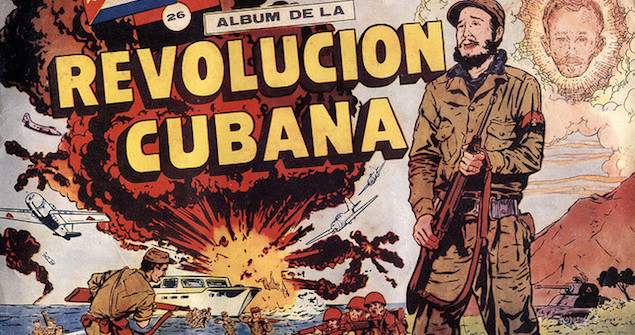Take Cuba Off the Terrorist List

The new US-Cuba talks are a refreshing burst of sunshine in the 54-year dismal relationship between neighbours separated by a mere 90 miles.
The nations negotiated a successful swap of prisoners. The onerous travel restrictions the US government placed on just visiting the island are starting to crumble. Embassies in Washington and Havana will soon be opened. Rules designed to ease trade are being written. But despite this long-awaited meltdown of US policies that added to the island’s economic woes but never succeeded in tumbling Cuba’s communist government, a portion of the Cold War edifice remains intact: Cuba is still on the US terrorist list.
This list, reserved for countries that have “repeatedly provided support for acts of international terrorism”, is a very short one. It doesn’t include Saudi Arabia, the country that accounted for 15 of the 19 hijackers on 9/11 and has been responsible for spreading extremist Wahhabi ideology throughout the Middle East. It doesn’t include Pakistan, a country that has long been a staging ground for Islamic terrorists and on the receiving end of US drone strikes for the past decade. It certainly doesn’t include Israel, a country Amnesty International called “trigger happy” for using “unnecessary, arbitrary and brutal force” against Palestinians. It doesn’t even include North Korea, a country that recently threatened to bomb the “White House, the Pentagon and the whole US mainland.”
Of the world’s 196 countries, only four are included: Iran, Sudan, Syria…and Cuba.
The US government first put Cuba on the list three decades ago, in 1982, accusing the island of providing a safe haven for members of the Basque separatist group ETA and Colombia’s FARC rebels. It also accused Cuba of providing political asylum to Americans facing criminal and terrorism charges. In 2006, the State Department added that Cuba opposed the US-led war on terror and made no attempt to “track, block, or seize terrorist assets.”
Over the years, these accusations have faded as Latin American dictatorships were overthrown and leftist groups started using the ballot instead of bullets to gain power. In Columbia, where decades-long fighting between government and guerrilla groups persists, Cuba has become an internationally recognised and appreciated mediator hosting peace talks. The ETA called a ceasefire in 2011 and said it would disarm. And despite US accusations, after 9/11 Fidel Castro roundly condemned terrorism, refused to harbour individuals wanted for terrorism, and signed onto all UN-sanctioned anti-terrorism treaties.
In its 2013 Report on Terrorism, the State Department admitted that Cuba’s links to ETA have become more distant and that Cuba has been hosting negotiations between Colombia’s government and FARC rebels. It also mentioned how there has been no indication that the Cuban government “provided weapons or paramilitary training to terrorist groups.”
Most people around the world would find it very strange that Cuba would be on a “terrorist list,” as it is most known worldwide for exporting doctors, musicians, teachers, artists, and dancers—not terrorists.
Cuba’s continued inclusion on the terrorist list has become a stumbling block in negotiations. While both sides have been upbeat about the recent talks, Cuba has complained and demanded to be removed from the terrorist list. The Cuban government considers it insulting and unfair; it also notes the United States has repeatedly supported terrorist acts and harbored terrorist fugitives, such as Luis Posada Carriles, convicted in absentia of the bombing of Cubana Flight 455 in which 73 people were killed.
Inclusion on the terrorist list is not just political jousting; it adds an extra burden to the economic restrictions associated with the long-standing US economic embargo, especially on the banking system. All banks engaging in financial transactions with Cuba are subjected to tedious US screenings to ensure that terrorist money does not enter the US. Banks dealing with countries on the US terrorist list are slapped with major fines, such as the huge $8.9 billion penalty that French bank BNP Paribas paid last year for dealing with Cuba, Sudan and Iran. Most foreign banks, even when engaged in perfectly legal transactions with Cuba, weigh their options and decide it’s not worth the hassle.
But change is in the air. Following the 17 December 2014 agreement to restore relations with Cuba, President Obama instructed the Secretary of State to launch a review of Cuba’s inclusion on the list and to provide a report and recommendation within six months.
If the recommendation is to remove Cuba from the list, the president would have to submit a report to Congress 45 days before the new decision would take effect. The report would have to ensure that Cuba had not provided any support for international terrorism in the preceding six months, and then offer guarantees that it would not do so in the future.
The decision to lift Cuban sanctions lies in the hands of Congress, but taking Cuba off the terrorist list is an action the president can take (he can also free the Guantanamo Bay prisoners who have been cleared for release, but that’s another issue). Cuban diplomats says they cannot conceive of re-establishing diplomatic relations with the United States while Cuba continues to be considered a sponsor of international terrorism. President Obama’s next executive action should include removing Cuba from the list.
Medea Benjamin, cofounder of Global Exchange and CODEPINK: Women for Peace, is the author of Drone Warfare: Killing by Remote Control. This article was originally published on Common Dreams on 28 January 2015 under a Creative Commons license.





